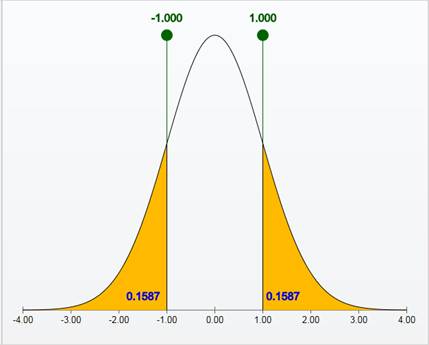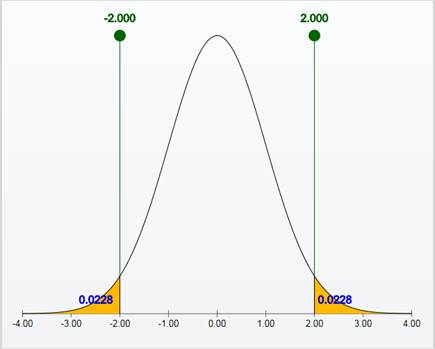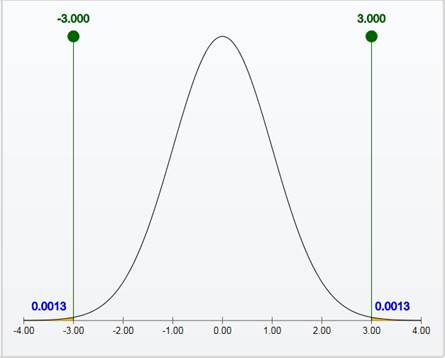
Concept explainers
a.
To explain: The area within 1 standard deviation of the
To compare: The area within 1 standard deviation of the mean by using applet and
a.
Answer to Problem 3.52E
The area within 1 standard deviation of the mean is 0.6826.
The area within 1 standard deviation of the mean by using applet and 68-95-99.7 rule is both approximately equal.
Explanation of Solution
Given info:
The mean and standard deviation of the
68-95-99.7 Rule:
About 68% of the observations fall within
About 95% of the observations fall within
About 99.7% of the observations fall within
Calculation:
Find the area of 1 standard deviation on either side of the mean using the normal density curve applet.
Applet procedure:
Step-by-step Applet procedure to find the area of 1 standard deviation on either side of the mean is given as follows:
- In Statistical Applets, choose Normal Density Curve.
- In the normal density curve drag one flag and place at 1 standard deviation on either side of the mean.
Output obtained from Applet:

From the Applet output, the area of one standard deviation below −1 is 0.1587 and the above 1 is 0.1587.
The formula to find the area within 1 standard deviation of the mean is,
Thus, the area within 1 standard deviation of the mean is 0.6826. That is, about 68% of the observations fall within
From the 68-95-99.7 rule, the area within 1 standard deviation of the mean is about 68%.
Justification:
The result of the area within 1 standard deviation of the mean is approximately same by using the applet and the 68-95-99.7 rule.
b.
To explain: The area within 2 standard deviations of the mean and the area within 3 standard deviations of the mean.
To compare: The area within 2 standard deviations of the mean and the area within 3 standard deviations of the mean by using applet and 68-95-99.7 rule.
b.
Answer to Problem 3.52E
The area within 2 standard deviations of the mean is 0.9544 and the area within 3 standard deviations of the mean is 0.9974.
The area within 2 standard deviations of the mean by using applet and 68-95-99.7 rule is both approximately equal and the area within 3 standard deviations of the mean by using applet and 68-95-99.7 rule is both approximately equal.
Explanation of Solution
Calculation:
Finding the area of 2 standard deviations on either side of the mean:
Applet procedure:
Step-by-step Applet procedure to find the area of 2 standard deviations on either side of the mean is given as follows
- In Statistical Applets, choose Normal Density Curve.
- In the normal density curve drag one flag and place at 2 standard deviations on either side of the mean.
Output obtained from Applet:

From the Applet output, the area to the left of −2 is 0.0228 and the area to right of 2 is 0.0228.
The formula to find the area within 2 standard deviations of the mean is,
Thus, the area within 2 standard deviations of the mean is 0.9544. That is, about 95% of the observations fall within
From the 68-95-99.7 rule, the area within 2 standard deviations of the mean is about 95%.
Finding the area of 3 standard deviations on either side of the mean:
Applet Procedure:
Step-by-step Applet procedure to find the area of 3 standard deviations on either side of the mean is given as follows
- In Statistical Applets, choose Normal Density Curve.
- In the normal density curve drag one flag and place at 3 standard deviations on either side of the mean.
Output obtained from Applet:

From the Applet output, the area to the left of −3 is 0.0013 and the area to right of 3 is 0.0013.
The formula to find the area within 3 standard deviations of the mean is,
Thus, the area within 3 standard deviations of the mean is 0.9974. That is, about 99.7% of the observations fall within
From the 68-95-99.7 rule, the area within 3 standard deviations of the mean is about 99.7%.
Justification:
The result of the area within 2 standard deviations of the mean is approximately same by using the applet and the 68-95-99.7 rule and also the result of the area within 3 standard deviations of the mean is approximately same by using the applet and the 68-95-99.7 rule.
Want to see more full solutions like this?
Chapter 3 Solutions
The Basic Practice of Statistics
- ons 12. A sociologist hypothesizes that the crime rate is higher in areas with higher poverty rate and lower median income. She col- lects data on the crime rate (crimes per 100,000 residents), the poverty rate (in %), and the median income (in $1,000s) from 41 New England cities. A portion of the regression results is shown in the following table. Standard Coefficients error t stat p-value Intercept -301.62 549.71 -0.55 0.5864 Poverty 53.16 14.22 3.74 0.0006 Income 4.95 8.26 0.60 0.5526 a. b. Are the signs as expected on the slope coefficients? Predict the crime rate in an area with a poverty rate of 20% and a median income of $50,000. 3. Using data from 50 workarrow_forward2. The owner of several used-car dealerships believes that the selling price of a used car can best be predicted using the car's age. He uses data on the recent selling price (in $) and age of 20 used sedans to estimate Price = Po + B₁Age + ε. A portion of the regression results is shown in the accompanying table. Standard Coefficients Intercept 21187.94 Error 733.42 t Stat p-value 28.89 1.56E-16 Age -1208.25 128.95 -9.37 2.41E-08 a. What is the estimate for B₁? Interpret this value. b. What is the sample regression equation? C. Predict the selling price of a 5-year-old sedan.arrow_forwardian income of $50,000. erty rate of 13. Using data from 50 workers, a researcher estimates Wage = Bo+B,Education + B₂Experience + B3Age+e, where Wage is the hourly wage rate and Education, Experience, and Age are the years of higher education, the years of experience, and the age of the worker, respectively. A portion of the regression results is shown in the following table. ni ogolloo bash 1 Standard Coefficients error t stat p-value Intercept 7.87 4.09 1.93 0.0603 Education 1.44 0.34 4.24 0.0001 Experience 0.45 0.14 3.16 0.0028 Age -0.01 0.08 -0.14 0.8920 a. Interpret the estimated coefficients for Education and Experience. b. Predict the hourly wage rate for a 30-year-old worker with four years of higher education and three years of experience.arrow_forward
- 1. If a firm spends more on advertising, is it likely to increase sales? Data on annual sales (in $100,000s) and advertising expenditures (in $10,000s) were collected for 20 firms in order to estimate the model Sales = Po + B₁Advertising + ε. A portion of the regression results is shown in the accompanying table. Intercept Advertising Standard Coefficients Error t Stat p-value -7.42 1.46 -5.09 7.66E-05 0.42 0.05 8.70 7.26E-08 a. Interpret the estimated slope coefficient. b. What is the sample regression equation? C. Predict the sales for a firm that spends $500,000 annually on advertising.arrow_forwardCan you help me solve problem 38 with steps im stuck.arrow_forwardHow do the samples hold up to the efficiency test? What percentages of the samples pass or fail the test? What would be the likelihood of having the following specific number of efficiency test failures in the next 300 processors tested? 1 failures, 5 failures, 10 failures and 20 failures.arrow_forward
- The battery temperatures are a major concern for us. Can you analyze and describe the sample data? What are the average and median temperatures? How much variability is there in the temperatures? Is there anything that stands out? Our engineers’ assumption is that the temperature data is normally distributed. If that is the case, what would be the likelihood that the Safety Zone temperature will exceed 5.15 degrees? What is the probability that the Safety Zone temperature will be less than 4.65 degrees? What is the actual percentage of samples that exceed 5.25 degrees or are less than 4.75 degrees? Is the manufacturing process producing units with stable Safety Zone temperatures? Can you check if there are any apparent changes in the temperature pattern? Are there any outliers? A closer look at the Z-scores should help you in this regard.arrow_forwardNeed help pleasearrow_forwardPlease conduct a step by step of these statistical tests on separate sheets of Microsoft Excel. If the calculations in Microsoft Excel are incorrect, the null and alternative hypotheses, as well as the conclusions drawn from them, will be meaningless and will not receive any points. 4. One-Way ANOVA: Analyze the customer satisfaction scores across four different product categories to determine if there is a significant difference in means. (Hints: The null can be about maintaining status-quo or no difference among groups) H0 = H1=arrow_forward
- Please conduct a step by step of these statistical tests on separate sheets of Microsoft Excel. If the calculations in Microsoft Excel are incorrect, the null and alternative hypotheses, as well as the conclusions drawn from them, will be meaningless and will not receive any points 2. Two-Sample T-Test: Compare the average sales revenue of two different regions to determine if there is a significant difference. (Hints: The null can be about maintaining status-quo or no difference among groups; if alternative hypothesis is non-directional use the two-tailed p-value from excel file to make a decision about rejecting or not rejecting null) H0 = H1=arrow_forwardPlease conduct a step by step of these statistical tests on separate sheets of Microsoft Excel. If the calculations in Microsoft Excel are incorrect, the null and alternative hypotheses, as well as the conclusions drawn from them, will be meaningless and will not receive any points 3. Paired T-Test: A company implemented a training program to improve employee performance. To evaluate the effectiveness of the program, the company recorded the test scores of 25 employees before and after the training. Determine if the training program is effective in terms of scores of participants before and after the training. (Hints: The null can be about maintaining status-quo or no difference among groups; if alternative hypothesis is non-directional, use the two-tailed p-value from excel file to make a decision about rejecting or not rejecting the null) H0 = H1= Conclusion:arrow_forwardPlease conduct a step by step of these statistical tests on separate sheets of Microsoft Excel. If the calculations in Microsoft Excel are incorrect, the null and alternative hypotheses, as well as the conclusions drawn from them, will be meaningless and will not receive any points. The data for the following questions is provided in Microsoft Excel file on 4 separate sheets. Please conduct these statistical tests on separate sheets of Microsoft Excel. If the calculations in Microsoft Excel are incorrect, the null and alternative hypotheses, as well as the conclusions drawn from them, will be meaningless and will not receive any points. 1. One Sample T-Test: Determine whether the average satisfaction rating of customers for a product is significantly different from a hypothetical mean of 75. (Hints: The null can be about maintaining status-quo or no difference; If your alternative hypothesis is non-directional (e.g., μ≠75), you should use the two-tailed p-value from excel file to…arrow_forward
 MATLAB: An Introduction with ApplicationsStatisticsISBN:9781119256830Author:Amos GilatPublisher:John Wiley & Sons Inc
MATLAB: An Introduction with ApplicationsStatisticsISBN:9781119256830Author:Amos GilatPublisher:John Wiley & Sons Inc Probability and Statistics for Engineering and th...StatisticsISBN:9781305251809Author:Jay L. DevorePublisher:Cengage Learning
Probability and Statistics for Engineering and th...StatisticsISBN:9781305251809Author:Jay L. DevorePublisher:Cengage Learning Statistics for The Behavioral Sciences (MindTap C...StatisticsISBN:9781305504912Author:Frederick J Gravetter, Larry B. WallnauPublisher:Cengage Learning
Statistics for The Behavioral Sciences (MindTap C...StatisticsISBN:9781305504912Author:Frederick J Gravetter, Larry B. WallnauPublisher:Cengage Learning Elementary Statistics: Picturing the World (7th E...StatisticsISBN:9780134683416Author:Ron Larson, Betsy FarberPublisher:PEARSON
Elementary Statistics: Picturing the World (7th E...StatisticsISBN:9780134683416Author:Ron Larson, Betsy FarberPublisher:PEARSON The Basic Practice of StatisticsStatisticsISBN:9781319042578Author:David S. Moore, William I. Notz, Michael A. FlignerPublisher:W. H. Freeman
The Basic Practice of StatisticsStatisticsISBN:9781319042578Author:David S. Moore, William I. Notz, Michael A. FlignerPublisher:W. H. Freeman Introduction to the Practice of StatisticsStatisticsISBN:9781319013387Author:David S. Moore, George P. McCabe, Bruce A. CraigPublisher:W. H. Freeman
Introduction to the Practice of StatisticsStatisticsISBN:9781319013387Author:David S. Moore, George P. McCabe, Bruce A. CraigPublisher:W. H. Freeman





